In the early days of a startup, you’re relying on ad hoc communication setups. You’ve got your personal phone, a shared inbox, and maybe a basic no-frills VoIP line. But what happens when customer demand outgrows those?
Suddenly, that ad hoc system breaks. Promising leads call and hit a busy signal. Frustrated customers are lost in unanswered emails. Your team spends more time apologizing for the chaos than actually helping.
Failure at this stage is not just an inconvenience. It’s a growth ceiling that leads to high churn, lost revenue, and a damaged brand reputation right when you need to be scaling.
This is the point where specialized call center tools come in and solve the issue affordably. Modern cloud call center platforms are full of call handling functionality, automation, and artificial intelligence (AI) without costing a fortune, and they’re exactly what startups need to grow.
Why Startups Need Call Center Software
Startups need call center software for multiple reasons:
Rapid growth and high expectations
If you increase your customer base without appropriate customer experience tools, you’re setting yourself up for failure.
To deal with rapid growth, your call center software must meet and exceed the expectations of your new, risk-taking customers from day one. Customers expect immediate, professional responses, whether they’re contacting support or sales, with little care for how new your business is or what technology you’re using.
A call center platform helps teams maintain consistency and responsiveness during growth spikes, removing the chance of unanswered voicemails or nonresponsive account reps.
Remote and distributed work
As the pool for talent has expanded with the introduction of remote work, you need to ensure every team member has access to the tools you’re using to support your customers.
Cloud call centers let agents work from anywhere with internet access. This benefits your startup by not only enabling remote access to phone calls, chats, and emails but also allowing you to start hiring from further afield to offer 24/7, follow-the-sun customer support.
It’s not like you’re enabling them and leaving them to their own devices, either. All the while, you benefit from real-time dashboards and quality monitoring to help leaders manage distributed agents effectively.

Building brand credibility
When you opt for call center software, you can present professional options like interactive voice response (IVR) menus, call queues, and local/toll-free phone numbers.
These don’t just project legitimacy but also help you compete with larger companies. By delivering a polished, reliable customer experience, you paint the picture of an established brand that’s ready to handle all types of customer inquiries.
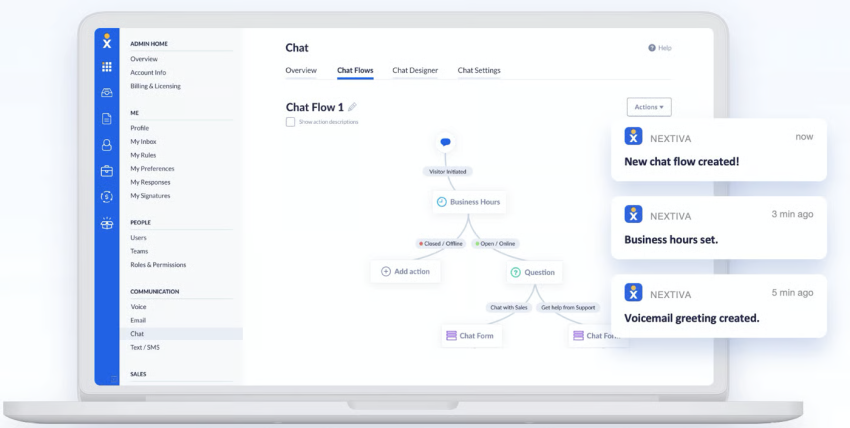
Automating repetitive tasks
With pressure to build a pipeline and close sales activity, time spent on menial, manual tasks often gets deprioritized. Until you have some form of call center automation to take care of that for you, simply hoping it goes away is not an option, and you lose vital time to tasks that could be automated.
Use built-in call center automation to complete the following:
- Call routing to the right person or department instead of manual transfers.
- Automated post-call follow-ups instead of manual data entry.
- IVRs handling routine voice-based inquiries like checking balances and opening times.
- Chatbots handling routine web-based questions, freeing agents for higher-value work.
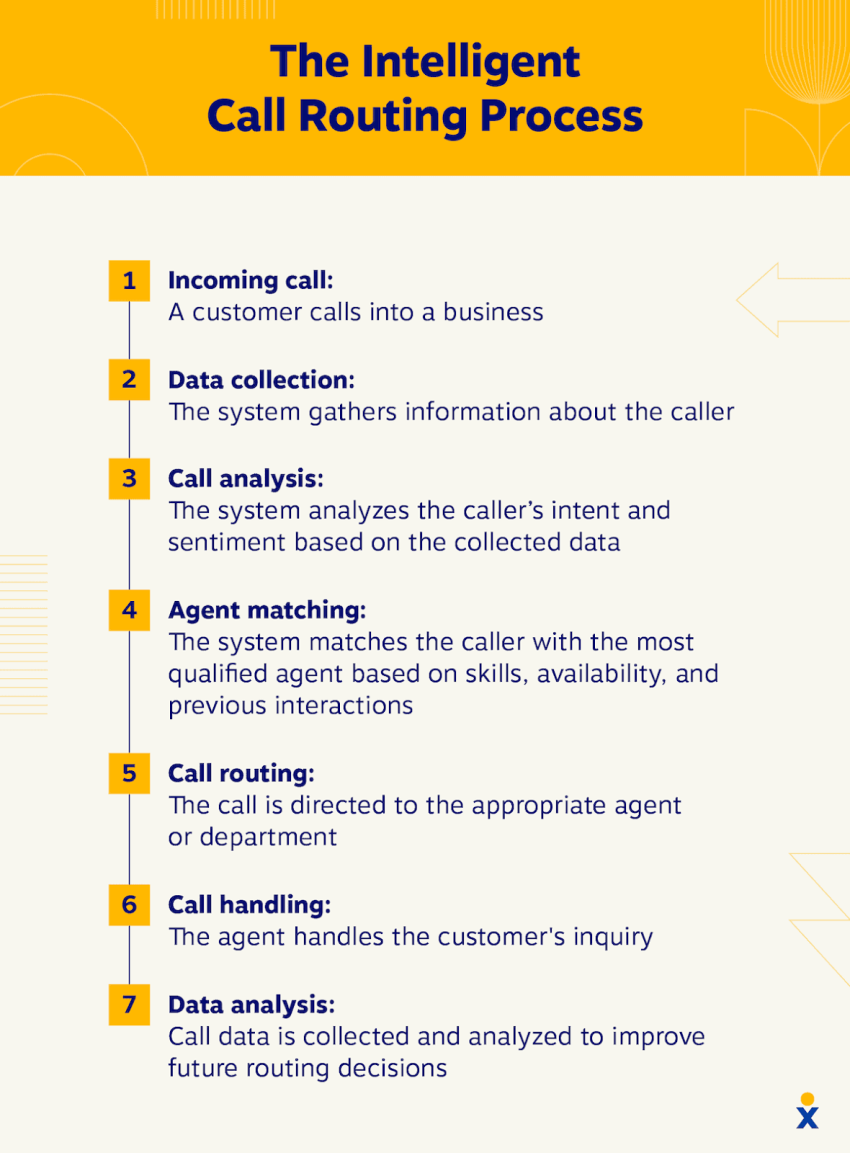
Balancing cost and capability
As a startup, you may not have the luxury of installing on-premises hardware or paying often-expensive fees to a business process outsourcing (BPO) firm.
Instead, opting for a SaaS call center eliminates hardware, setup fees, and maintenance costs. You get a Netflix-like subscription with pricing that makes enterprise-grade call center services accessible to lean teams.
With most providers, you choose the pricing tier that matches your business needs and can scale up and down as needed, with no upfront investment.
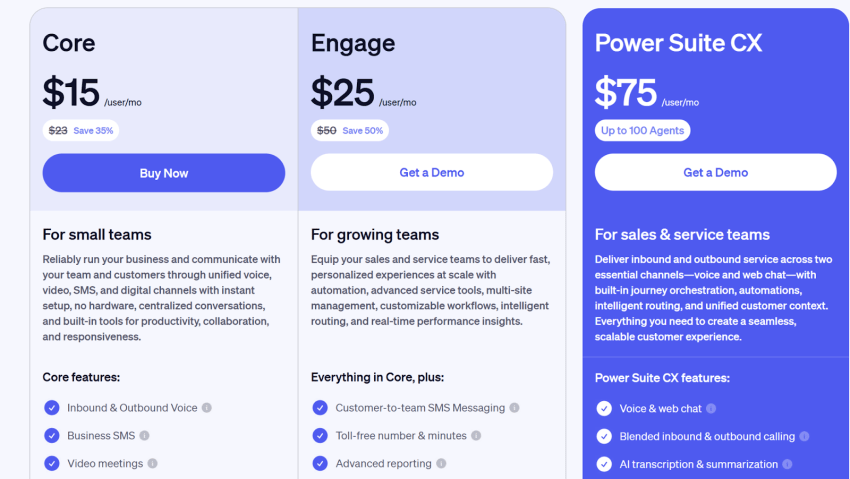
Key Benefits of Call Center Software for Startups
Here’s how call center software benefits startups:
Scalability
As a growing business, you need the confidence that you’ll be able to increase agent count at the drop of a hat. If you can’t add or remove agents instantly without IT involvement, there’s a problem. That problem might be that you simply don’t have the time or even the IT resources to make such changes.
Likewise, expanding to new channels (chat, email, SMS, social media) as customer demand grows must be simple. With modern call center software, turning on channels is a line of code added to your website or a simple integration using a username and password.
Cost efficiency
Even the startups with serious capital don’t want to overpay at the beginning of a contract for something they may not use to full capacity.
Cloud call center software lends itself to startup business models as its pay-as-you-go or tiered pricing prevents overinvestment in early stages. The whole concept of cloud hosting is designed to reduce IT overhead and downtime.
Enhanced collaboration
For established startups, integrated chat and customer relationship management (CRM) tools connect sales, marketing, and support teams. Having a unified suite of platforms provides shared visibility into every customer touchpoint.
When time and productivity are vital, having a centralized source of information keeps customers happy and staff efficient.
Opting for call center software that also looks after your internal comms — or has its own built-in CRM — is even better. When you have access to all your communication and customer channels in a single platform, everything flows smoothly.
Better customer insights
Whether you’re getting started, are established, or are even a veteran of the customer service game, the more you know about your customers, the better you can serve them. Built-in analytics and reporting reveal call trends, customer satisfaction (CSAT) scores, and agent performance. AI-powered sentiment analysis even helps identify issues before they escalate.
If there’s a possible data point to report on, having that information available in your call center software helps influence better future business decisions.
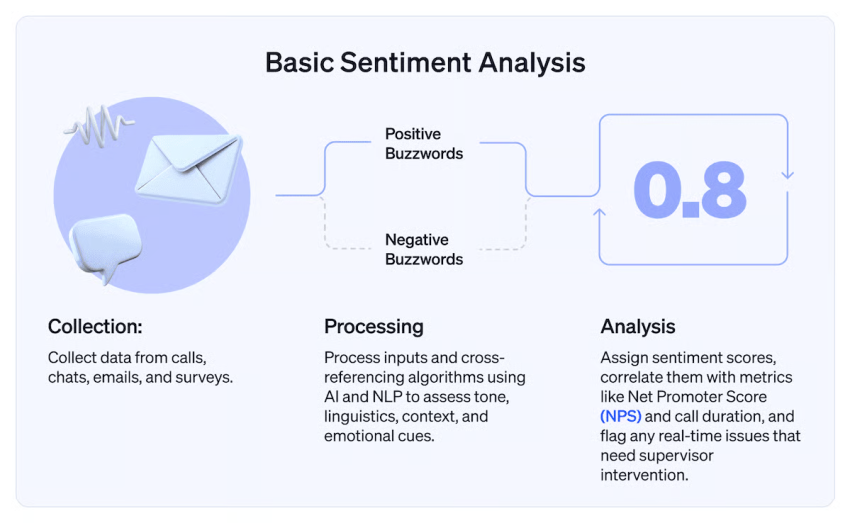
Must-Have Advanced Features for Startup Call Centers
What are the most important features to look for in call center for startups?
Omnichannel support
Deciding whether you need a call center vs. a contact center is the first step. But a modern-day customer base likely requires you to handle voice, SMS, social, email, and chat from one workspace.
While it’s possible to service them in siloed platforms, opt to maintain consistent experiences across every channel customers use. You achieve this by choosing an omnichannel contact center.
You get a cloud-based interface to house every call, email, chat, etc., without losing context or other customer interactions. Staff are productive without having to navigate between apps. Customer experience is what it should be: simple and without repetition.
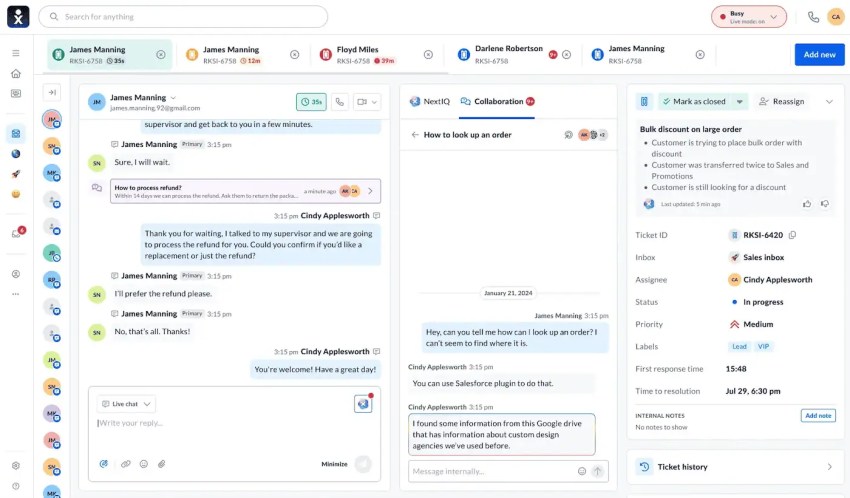
CRM integration
As you market to and sign up new customers, it’s likely you use a CRM system like HubSpot, Pipedrive, Salesforce, or Zoho to centralize customer data.
That’s just fine when you’re in the prospecting phase. But what happens post-sale when you need to start creating tickets, cross-referencing transaction history, and checking order statuses?
CRM integrations allow call center agents to view caller history and notes during live interactions by connecting your most-used customer platforms with your call center. Having all data and interaction history connected saves you and your customer minutes every time they contact you.
Call routing and IVR
The base-level requirement for call center for startups is to help you route inbound calls more efficiently. If your customers get through to the right person the first time, there’s a higher chance of first-call resolution (FCR).
Intelligent routing connects customers to the right department or rep automatically. This removes the chance of incorrect transfers and even enables humanless interactions. For queries like checking balances, making payments, and other basic inquiries, you can automate these, so there’s no need to wait at all.

AI and automation
Automating basic interactions is only the beginning. In more advanced (but not necessarily complex or expensive) call centers, you can use AI for call summaries, real-time agent assist, and performance analytics.
Stretching the potential further, more adventurous startups may automate follow-ups, transcriptions, and ticket creation. The more repetitive and manual tasks you can automate, the more time you can put back into your customers.
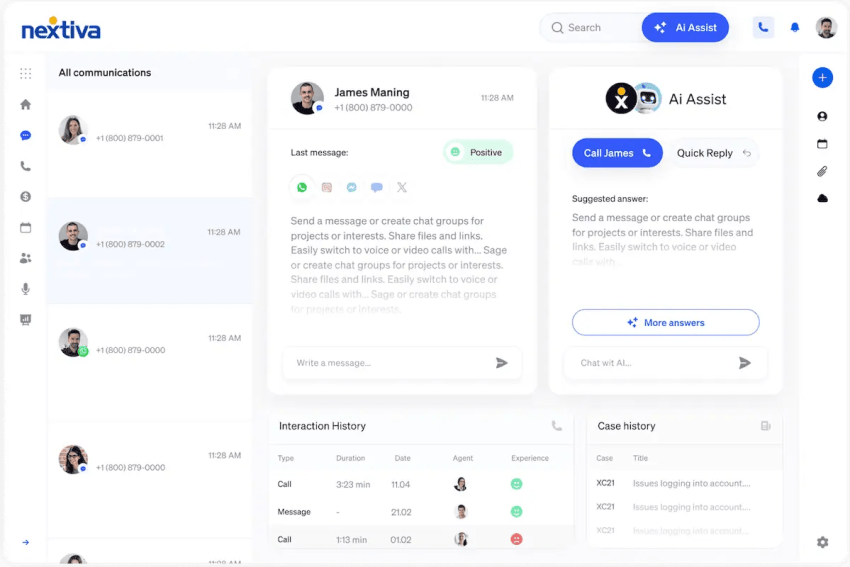
Analytics and reporting
Call reporting extends further than volumes and timestamps. You can get these on any business phone system, but that’s not enough as you scale your startup.
With cloud software, you get direct access to track metrics like call volume, average handle time (AHT), and FCR. The more visibility you have into service trends, especially in your early years, the more you can optimize resources, routing, and training.

Ease of use
It should go without saying that new technology must be easy to understand and require minimal onboarding. When you get a new iPhone, how long does it take you to learn how to use it? That’s almost the reality with the market-leading call center for startups.
You get visual dashboards, click-to-call functions, and drag-and-drop workflows to make setup quick and easy. Contact center agents, infrequent users, and admins alike just start using the app and serving your customers.
Top Call Center Software for Startups in 2026
1. Nextiva
Why it’s best for startups:
Nextiva is built to solve the specific communication chaos startups face. For remote and distributed teams, it’s a single, unified app (for desktop and mobile) that works anywhere there’s internet.
To help you build brand credibility, professional tools like a virtual receptionist and advanced call routing are included even in the entry-level Core plan. And to manage rapid growth, Nextiva scales easily from one founder to a full omnichannel support team on the Power Suite CX plan, all on the same reliable platform. It’s call center software built with startups and small businesses in mind.
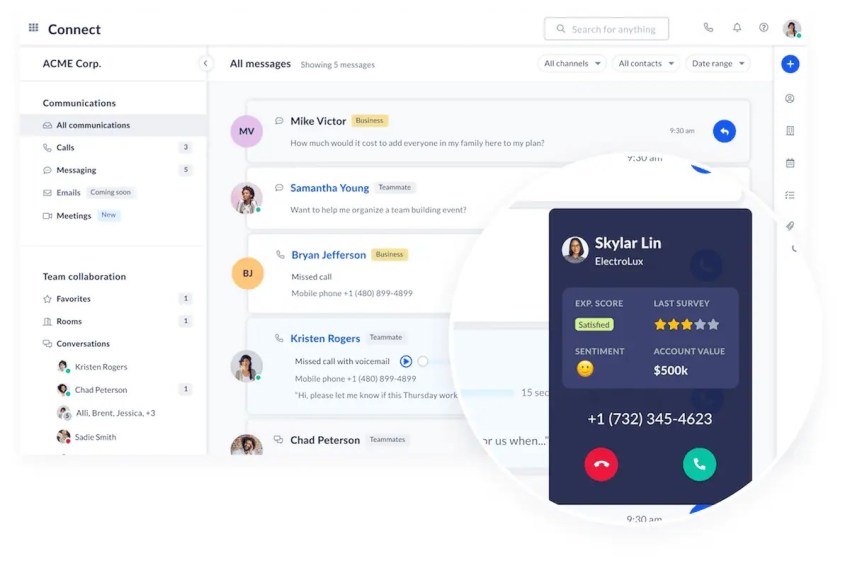
Key features:
Nextiva’s features are designed to grow with you. Here’s how its capabilities expand across plans:
- Scales with you, not ahead of you: Start affordably with the Core plan for essential calling, business SMS, and team chat. As your needs grow, scale to the Engage and Power Suite CX plans to add advanced omnichannel and AI features without switching platforms.
- Unified customer engagement: Consolidate voice and web chat into a single workspace, with AI-powered transcription and summarization to track every conversation.
- Built-in automation: Get web chat with bot options, and add process automation and real-time dashboards to reduce manual work.
- Enterprise reliability for startups: High uptime, 24/7 support, and integrations with Outlook and Google contacts expand to advanced CRM integrations.
- Advanced analytics: Advanced reporting and voice analytics give founders clear insights into team performance and customer trends.
Best for: Startups seeking an all-in-one platform that grows with them and connects sales, support, and service seamlessly.
2. Aircall
Why it’s great:
Aircall is lightweight, operates in a browser, and comes with a quick setup time for fast-moving startups. As standard, you get integration with HubSpot, Pipedrive, and Shopify. Even if you’re not using these yet because of their “expensive” stigma, it’s a stretch goal you’ll be thankful you prepared for.
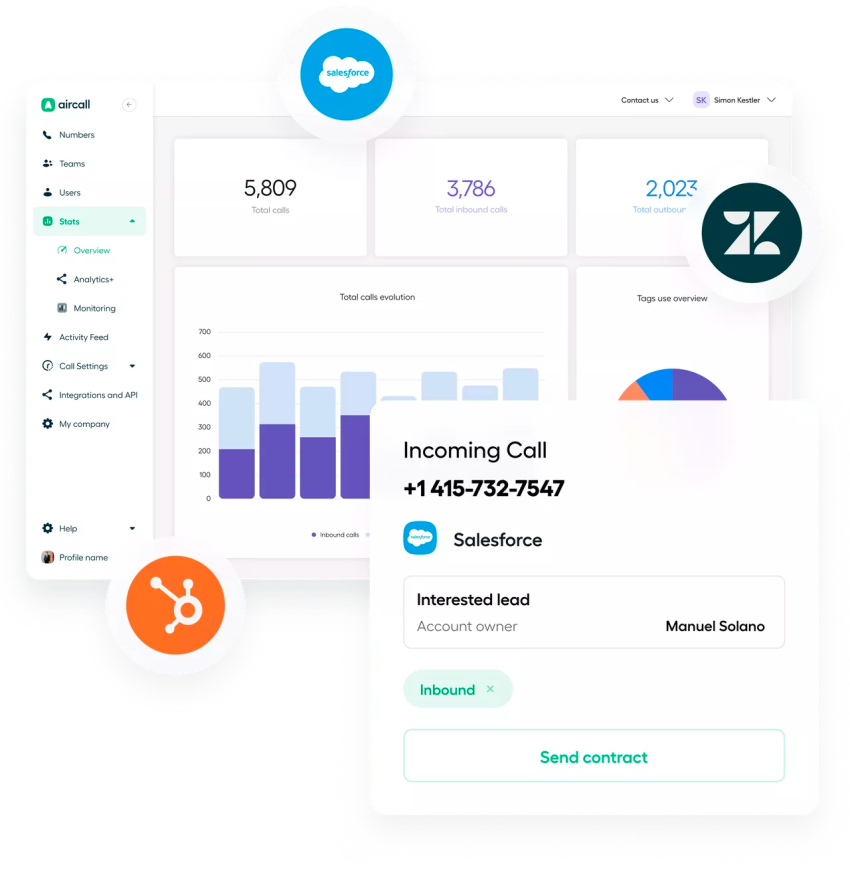
Key features:
- Rapid CRM integration: Connects to CRMs like HubSpot and Salesforce, plus helpdesks like Zendesk and e-commerce platforms like Shopify.
- Real-time agent coaching: Uses call monitoring (listen in, whisper) and call recording for quality assurance and training remote teams.
- Streamlined call management: Features essential tools like customizable IVR, call queuing, and shared inboxes to manage inbound calls professionally.
- Sales productivity tools: Includes a power dialer and click-to-call functionality directly from your CRM to boost outbound team efficiency.
Best for: Remote-first startups that prioritize ease of use and quick deployment.
3. RingCentral
Why it’s great:
RingCentral offers voice, messaging, and video in one platform with a contact center module using the same robust enterprise-level features. The scalability is clear for growing teams with RingCentral, referencing customers in the high thousands.

Key features:
- Unified platform: Combines team messaging, video meetings, and a cloud phone system in one application.
- True omnichannel routing: Engages customers across voice, email, SMS, social media, and live web chat in its dedicated contact center solution.
- Advanced outbound dialers: Offers progressive, predictive, and preview dialers to maximize outbound sales and support team productivity.
- Extensive integration marketplace: Connects to over 300 business apps, including deep integrations with Google Workspace, Microsoft 365, and major CRMs.
- AI-powered insights: Provides detailed speech and text analytics, real-time agent insights, and predictive analytics on higher-tier plans.
Best for: Startups anticipating rapid growth who want to avoid outgrowing their first solution.
4. Freshdesk Contact Center (formerly Freshcaller)
Why it’s great:
In its entry-level pricing tier, Freshdesk is budget-friendly with strong call center automation and reporting tools. With all pricing plans, you get native integration with the Freshdesk support suite (for ticketing) and Freshsales (for CRM) for unified support tracking — a crucial time and money saver for early startups.
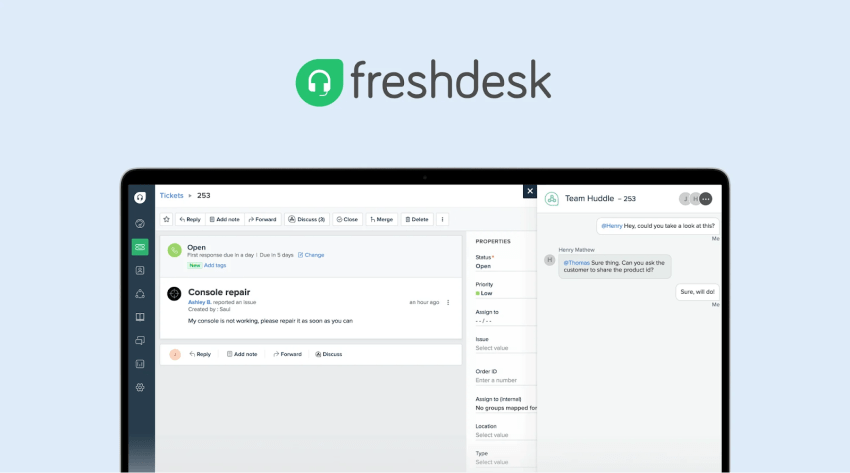
Key features:
- Native Freshworks integration: Connects with the Freshdesk support suite and Freshsales CRM for a unified agent and customer record.
- Support-focused automation: Uses smart routing and automation features to get tickets and calls to the right support agent or group.
- Simple, intuitive UI: Features a clear and easy-to-use interface designed to help support agents manage inquiries with minimal training.
- Multichannel support: Manages customer conversations from voice, email, and social media (like X/Twitter and Facebook) within the Freshdesk platform.
Best for: Startups building a service desk or customer support function.
5. CloudTalk
Why it’s great:
CloudTalk is built specifically for outbound sales and customer engagement. If that sounds like your startup, you get access to local number options, power dialing, and analytics on how your telemarketing and cold calling teams are performing.
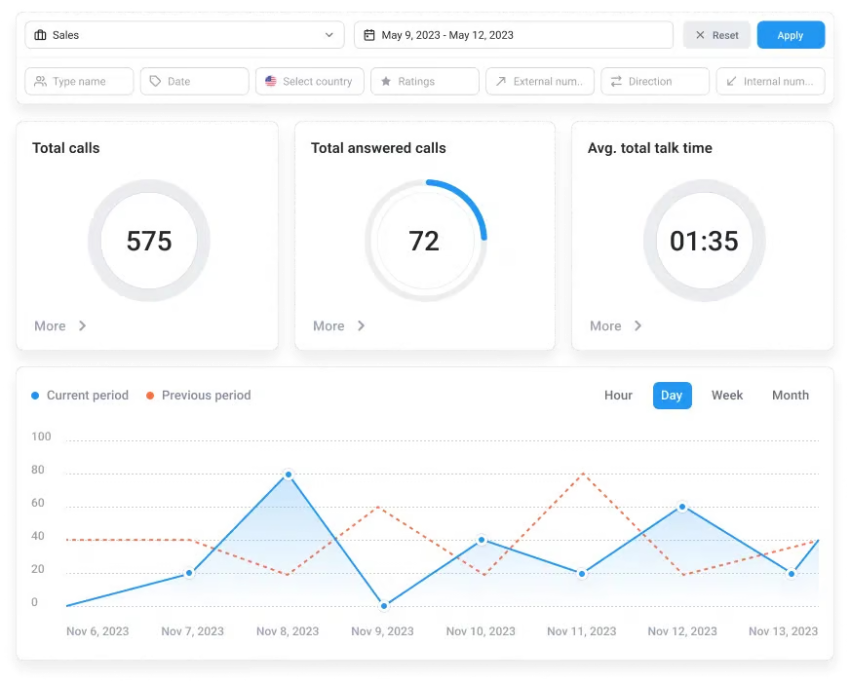
Key features:
- Sales-centric CRM integration: Offers two-way data sync and click-to-call from inside sales CRMs like HubSpot, Salesforce, and Pipedrive.
- Powerful outbound dialers: Includes smart, power, and predictive dialers to increase call volume and connection rates for sales teams.
- Visual call flow designer: Allows startups to easily build custom IVR menus and skill-based routing rules to direct inbound leads effectively.
- International call flexibility: Provides access to local phone numbers from over 160 countries, ideal for startups with a global customer base.
Best for: Startups running sales or lead generation campaigns.
6. Dialpad
Why it’s great:
Dialpad is known for its AI-first approach to customer service and outbound sales. As something of a pioneer, Dialpad has been providing AI-driven transcription, call coaching, and sentiment analysis since before it was cool.
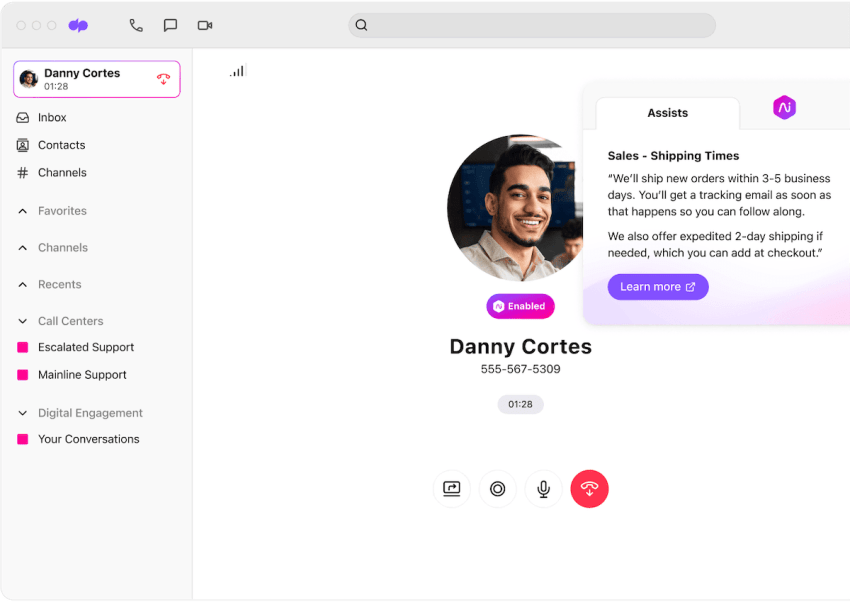
Key features:
- Real-time AI on every call: Provides live transcription, sentiment analysis, and keyword tracking for all conversations, giving managers instant insights.
- AI-powered agent assists: Pops up real-time, on-screen guidance (AI Agent Assist) and talking points (AI Playbooks) when specific keywords are mentioned.
- Automated quality management: Uses AI to automatically score agent interactions against predefined quality checklists, saving supervisor time.
- Self-service virtual agents: Helps create AI-powered virtual agents that can handle routine customer inquiries 24/7 without human intervention.
Best for: Startups prioritizing AI innovation and call intelligence.

How to Choose the Right Platform
With a wealth of material surrounding why each call center software is best for startups, we’ve created a quick-fire checklist to help you narrow your selection.
Define use cases
Ask these key questions to clarify your objectives:
- What is your primary contact center objective: inbound support, outbound sales, or a hybrid approach?
- Which communication channels do your customers prefer, and which workflows require the most automation?
- What metrics will define success for your customer service operations in the next 12-18 months?
Compare integration ecosystems
Evaluate how the software will connect to your existing tools:
- Which core business tools does your team rely on daily, and how critical is seamless data flow between systems?
- Does the platform offer prebuilt integrations with your existing tech stack, or will you need developer resources to connect systems?
- How does the contact center software handle data synchronization, and will customer information update in real time across your tools?
Plan for growth
Consider your long-term scalability and vendor relationship:
- Can the platform accommodate your projected growth in agent seats, contact volume, and feature complexity without forced migrations?
- What contractual flexibility does the vendor offer regarding commitment periods, cancellation terms, and feature downgrades?
- Does the vendor’s product roadmap and pricing model indicate they’re building for businesses at your stage, or will you outgrow them quickly?
Prioritize support and uptime
Verify the vendor’s commitment to reliability and service:
- What are the vendor’s documented uptime SLAs, and how transparent are they about historical outages and system status?
- Does the vendor provide 24/7 support access with guaranteed response times, or will you face delayed assistance during critical failures?
- What onboarding resources, documentation quality, and community support options exist to help your team resolve issues independently?
Nextiva Checks all These Boxes for Startups
For startups, call center software can be the foundation of professional, scalable customer communication. Leaping from ad hoc solutions like personal phones and shared Slack channels may feel expensive, but it doesn’t have to be.
The best tools combine affordability, simplicity, and automation, allowing small teams to deliver big experiences.
Nextiva helps startups grow faster with one platform that unites calls, chats, emails, and customer context in a single workspace. For founders who value clarity, scalability, and service excellence, Nextiva makes customer communication effortless from day one.
Want the best call center for your startup? Check out what Nextiva can do here. 👇
Top Ranked AI-Powered Contact Center Solution
Transform your customer interactions with a contact center platform that saves you time and money, reduces agent and supervisor stress, and flexibly adapts to fit your needs.

















 Customer Experience
Customer Experience 










